苔丝悲剧原因分析
- 格式:doc
- 大小:83.50 KB
- 文档页数:21
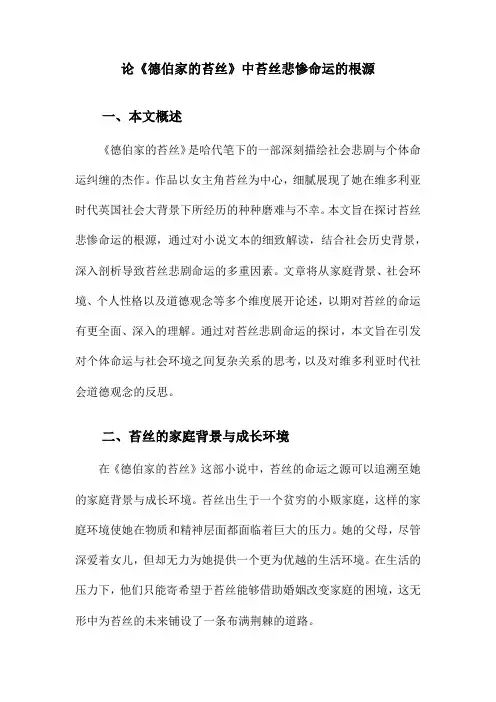
论《德伯家的苔丝》中苔丝悲惨命运的根源一、本文概述《德伯家的苔丝》是哈代笔下的一部深刻描绘社会悲剧与个体命运纠缠的杰作。
作品以女主角苔丝为中心,细腻展现了她在维多利亚时代英国社会大背景下所经历的种种磨难与不幸。
本文旨在探讨苔丝悲惨命运的根源,通过对小说文本的细致解读,结合社会历史背景,深入剖析导致苔丝悲剧命运的多重因素。
文章将从家庭背景、社会环境、个人性格以及道德观念等多个维度展开论述,以期对苔丝的命运有更全面、深入的理解。
通过对苔丝悲剧命运的探讨,本文旨在引发对个体命运与社会环境之间复杂关系的思考,以及对维多利亚时代社会道德观念的反思。
二、苔丝的家庭背景与成长环境在《德伯家的苔丝》这部小说中,苔丝的命运之源可以追溯至她的家庭背景与成长环境。
苔丝出生于一个贫穷的小贩家庭,这样的家庭环境使她在物质和精神层面都面临着巨大的压力。
她的父母,尽管深爱着女儿,但却无力为她提供一个更为优越的生活环境。
在生活的压力下,他们只能寄希望于苔丝能够借助婚姻改变家庭的困境,这无形中为苔丝的未来铺设了一条布满荆棘的道路。
在这样的家庭背景下,苔丝的成长环境也充满了挑战。
她不仅要面对生活的艰辛,还要应对社会对贫困家庭的偏见和歧视。
她的纯真和善良在这样的环境中显得格格不入,这也为她日后遭遇的种种不幸埋下了伏笔。
在苔丝的成长过程中,她缺乏足够的关爱和引导,这使得她在面对人生的重大抉择时,常常显得无所适从。
在这样的家庭与成长环境下,苔丝的命运似乎早已注定。
她的纯真和善良成为了她最大的软肋,使她在面对世俗的丑恶时,无力抵抗。
而她的家庭背景则成为了她无法摆脱的枷锁,使她在追求幸福的道路上步履维艰。
因此,可以说苔丝的家庭背景与成长环境是她悲惨命运的根源之一。
然而,尽管苔丝的命运充满了悲剧色彩,但她的坚韧和勇敢却让人深感敬佩。
她在面对生活的种种不幸时,从未放弃过对美好未来的向往和追求。
她的故事让我们深刻认识到,家庭背景与成长环境虽然对个体的命运有着深远的影响,但个体的坚韧和勇气同样能够创造出属于自己的未来。
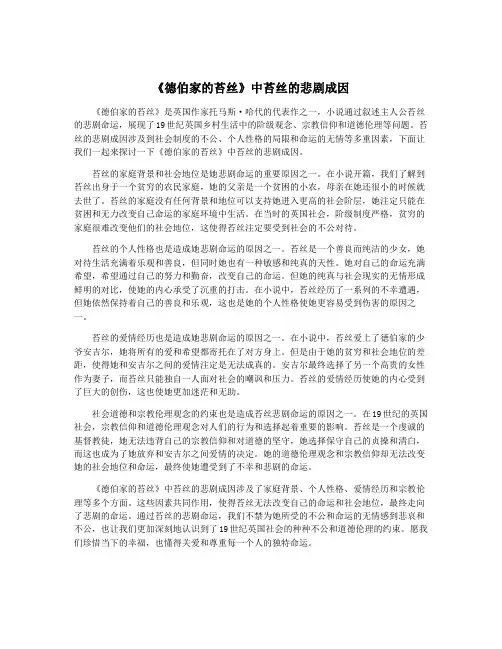
《德伯家的苔丝》中苔丝的悲剧成因《德伯家的苔丝》是英国作家托马斯·哈代的代表作之一,小说通过叙述主人公苔丝的悲剧命运,展现了19世纪英国乡村生活中的阶级观念、宗教信仰和道德伦理等问题。
苔丝的悲剧成因涉及到社会制度的不公、个人性格的局限和命运的无情等多重因素,下面让我们一起来探讨一下《德伯家的苔丝》中苔丝的悲剧成因。
苔丝的家庭背景和社会地位是她悲剧命运的重要原因之一。
在小说开篇,我们了解到苔丝出身于一个贫穷的农民家庭,她的父亲是一个贫困的小农,母亲在她还很小的时候就去世了。
苔丝的家庭没有任何背景和地位可以支持她进入更高的社会阶层,她注定只能在贫困和无力改变自己命运的家庭环境中生活。
在当时的英国社会,阶级制度严格,贫穷的家庭很难改变他们的社会地位,这使得苔丝注定要受到社会的不公对待。
苔丝的个人性格也是造成她悲剧命运的原因之一。
苔丝是一个善良而纯洁的少女,她对待生活充满着乐观和善良,但同时她也有一种敏感和纯真的天性。
她对自己的命运充满希望,希望通过自己的努力和勤奋,改变自己的命运。
但她的纯真与社会现实的无情形成鲜明的对比,使她的内心承受了沉重的打击。
在小说中,苔丝经历了一系列的不幸遭遇,但她依然保持着自己的善良和乐观,这也是她的个人性格使她更容易受到伤害的原因之一。
苔丝的爱情经历也是造成她悲剧命运的原因之一。
在小说中,苔丝爱上了徳伯家的少爷安吉尔,她将所有的爱和希望都寄托在了对方身上。
但是由于她的贫穷和社会地位的差距,使得她和安吉尔之间的爱情注定是无法成真的。
安吉尔最终选择了另一个高贵的女性作为妻子,而苔丝只能独自一人面对社会的嘲讽和压力。
苔丝的爱情经历使她的内心受到了巨大的创伤,这也使她更加迷茫和无助。
社会道德和宗教伦理观念的约束也是造成苔丝悲剧命运的原因之一。
在19世纪的英国社会,宗教信仰和道德伦理观念对人们的行为和选择起着重要的影响。
苔丝是一个虔诚的基督教徒,她无法违背自己的宗教信仰和对道德的坚守,她选择保守自己的贞操和清白,而这也成为了她放弃和安吉尔之间爱情的决定。
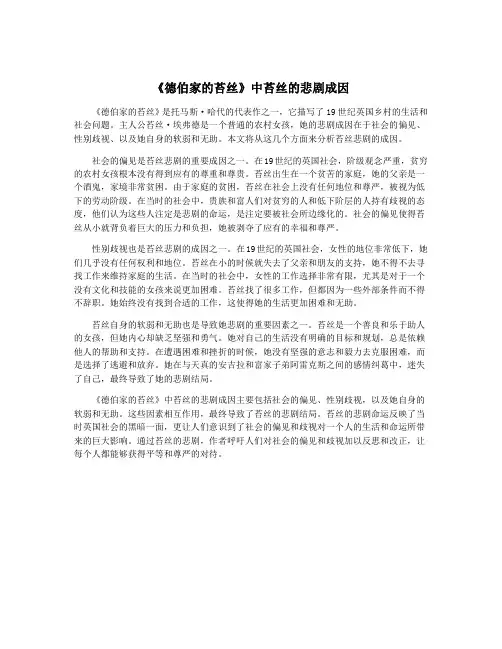
《德伯家的苔丝》中苔丝的悲剧成因《德伯家的苔丝》是托马斯·哈代的代表作之一,它描写了19世纪英国乡村的生活和社会问题。
主人公苔丝·埃弗德是一个普通的农村女孩,她的悲剧成因在于社会的偏见、性别歧视、以及她自身的软弱和无助。
本文将从这几个方面来分析苔丝悲剧的成因。
社会的偏见是苔丝悲剧的重要成因之一。
在19世纪的英国社会,阶级观念严重,贫穷的农村女孩根本没有得到应有的尊重和尊贵。
苔丝出生在一个贫苦的家庭,她的父亲是一个酒鬼,家境非常贫困。
由于家庭的贫困,苔丝在社会上没有任何地位和尊严,被视为低下的劳动阶级。
在当时的社会中,贵族和富人们对贫穷的人和低下阶层的人持有歧视的态度,他们认为这些人注定是悲剧的命运,是注定要被社会所边缘化的。
社会的偏见使得苔丝从小就背负着巨大的压力和负担,她被剥夺了应有的幸福和尊严。
性别歧视也是苔丝悲剧的成因之一。
在19世纪的英国社会,女性的地位非常低下,她们几乎没有任何权利和地位。
苔丝在小的时候就失去了父亲和朋友的支持,她不得不去寻找工作来维持家庭的生活。
在当时的社会中,女性的工作选择非常有限,尤其是对于一个没有文化和技能的女孩来说更加困难。
苔丝找了很多工作,但都因为一些外部条件而不得不辞职。
她始终没有找到合适的工作,这使得她的生活更加困难和无助。
苔丝自身的软弱和无助也是导致她悲剧的重要因素之一。
苔丝是一个善良和乐于助人的女孩,但她内心却缺乏坚强和勇气。
她对自己的生活没有明确的目标和规划,总是依赖他人的帮助和支持。
在遭遇困难和挫折的时候,她没有坚强的意志和毅力去克服困难,而是选择了逃避和放弃。
她在与天真的安吉拉和富家子弟阿雷克斯之间的感情纠葛中,迷失了自己,最终导致了她的悲剧结局。
《德伯家的苔丝》中苔丝的悲剧成因主要包括社会的偏见、性别歧视,以及她自身的软弱和无助。
这些因素相互作用,最终导致了苔丝的悲剧结局。
苔丝的悲剧命运反映了当时英国社会的黑暗一面,更让人们意识到了社会的偏见和歧视对一个人的生活和命运所带来的巨大影响。
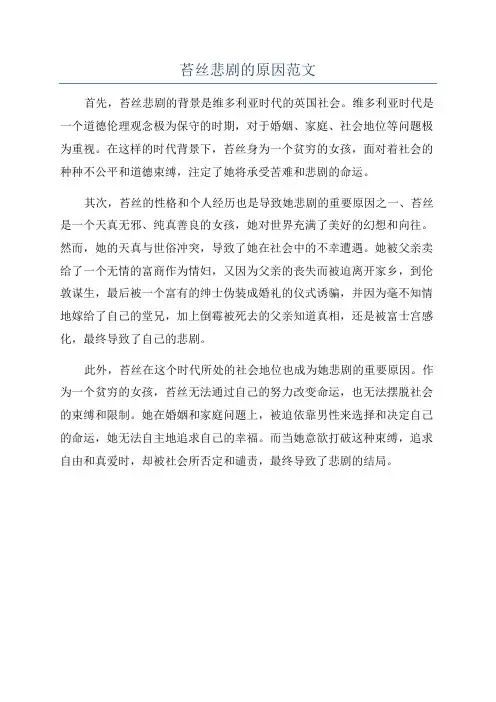
苔丝悲剧的原因范文
首先,苔丝悲剧的背景是维多利亚时代的英国社会。
维多利亚时代是一个道德伦理观念极为保守的时期,对于婚姻、家庭、社会地位等问题极为重视。
在这样的时代背景下,苔丝身为一个贫穷的女孩,面对着社会的种种不公平和道德束缚,注定了她将承受苦难和悲剧的命运。
其次,苔丝的性格和个人经历也是导致她悲剧的重要原因之一、苔丝是一个天真无邪、纯真善良的女孩,她对世界充满了美好的幻想和向往。
然而,她的天真与世俗冲突,导致了她在社会中的不幸遭遇。
她被父亲卖给了一个无情的富商作为情妇,又因为父亲的丧失而被迫离开家乡,到伦敦谋生,最后被一个富有的绅士伪装成婚礼的仪式诱骗,并因为毫不知情地嫁给了自己的堂兄,加上倒霉被死去的父亲知道真相,还是被富士宫感化,最终导致了自己的悲剧。
此外,苔丝在这个时代所处的社会地位也成为她悲剧的重要原因。
作为一个贫穷的女孩,苔丝无法通过自己的努力改变命运,也无法摆脱社会的束缚和限制。
她在婚姻和家庭问题上,被迫依靠男性来选择和决定自己的命运,她无法自主地追求自己的幸福。
而当她意欲打破这种束缚,追求自由和真爱时,却被社会所否定和谴责,最终导致了悲剧的结局。
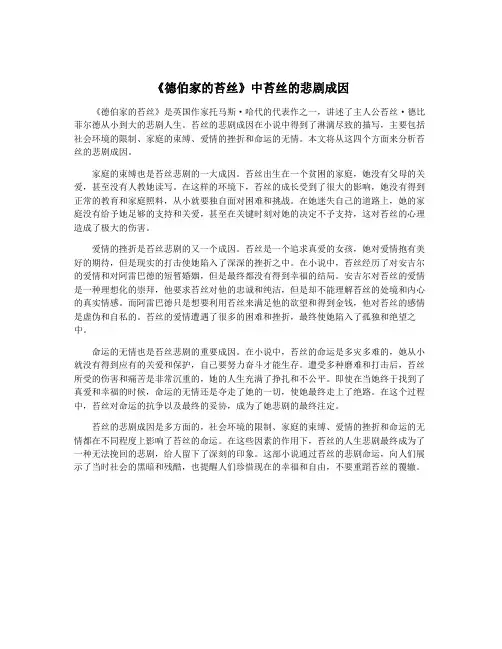
《德伯家的苔丝》中苔丝的悲剧成因《德伯家的苔丝》是英国作家托马斯·哈代的代表作之一,讲述了主人公苔丝·德比菲尔德从小到大的悲剧人生。
苔丝的悲剧成因在小说中得到了淋漓尽致的描写,主要包括社会环境的限制、家庭的束缚、爱情的挫折和命运的无情。
本文将从这四个方面来分析苔丝的悲剧成因。
家庭的束缚也是苔丝悲剧的一大成因。
苔丝出生在一个贫困的家庭,她没有父母的关爱,甚至没有人教她读写。
在这样的环境下,苔丝的成长受到了很大的影响,她没有得到正常的教育和家庭照料,从小就要独自面对困难和挑战。
在她迷失自己的道路上,她的家庭没有给予她足够的支持和关爱,甚至在关键时刻对她的决定不予支持,这对苔丝的心理造成了极大的伤害。
爱情的挫折是苔丝悲剧的又一个成因。
苔丝是一个追求真爱的女孩,她对爱情抱有美好的期待,但是现实的打击使她陷入了深深的挫折之中。
在小说中,苔丝经历了对安吉尔的爱情和对阿雷巴德的短暂婚姻,但是最终都没有得到幸福的结局。
安吉尔对苔丝的爱情是一种理想化的崇拜,他要求苔丝对他的忠诚和纯洁,但是却不能理解苔丝的处境和内心的真实情感。
而阿雷巴德只是想要利用苔丝来满足他的欲望和得到金钱,他对苔丝的感情是虚伪和自私的。
苔丝的爱情遭遇了很多的困难和挫折,最终使她陷入了孤独和绝望之中。
命运的无情也是苔丝悲剧的重要成因。
在小说中,苔丝的命运是多灾多难的,她从小就没有得到应有的关爱和保护,自己要努力奋斗才能生存。
遭受多种磨难和打击后,苔丝所受的伤害和痛苦是非常沉重的,她的人生充满了挣扎和不公平。
即使在当她终于找到了真爱和幸福的时候,命运的无情还是夺走了她的一切,使她最终走上了绝路。
在这个过程中,苔丝对命运的抗争以及最终的妥协,成为了她悲剧的最终注定。
苔丝的悲剧成因是多方面的,社会环境的限制、家庭的束缚、爱情的挫折和命运的无情都在不同程度上影响了苔丝的命运。
在这些因素的作用下,苔丝的人生悲剧最终成为了一种无法挽回的悲剧,给人留下了深刻的印象。
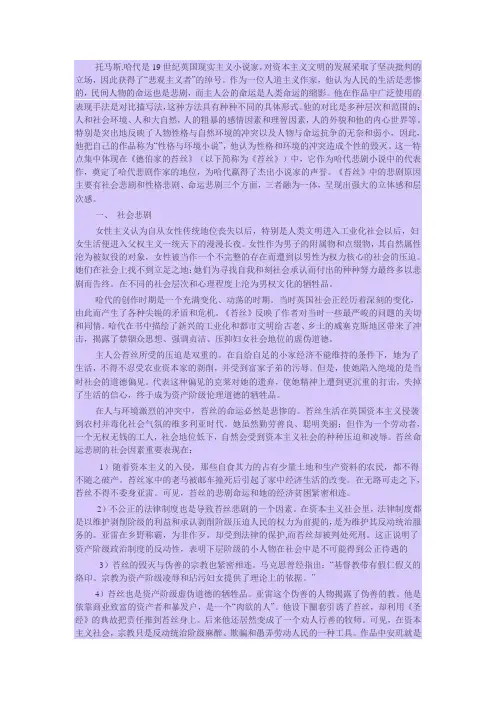
托马斯.哈代是19世纪英国现实主义小说家,对资本主义文明的发展采取了坚决批判的立场,因此获得了“悲观主义者”的绰号。
作为一位人道主义作家,他认为人民的生活是悲惨的,民间人物的命运也是悲剧,而主人公的命运是人类命运的缩影。
他在作品中广泛使用的表现手法是对比描写法,这种方法具有种种不同的具体形式。
他的对比是多种层次和范围的:人和社会环境、人和大自然,人的粗暴的感情因素和理智因素,人的外貌和他的内心世界等。
特别是突出地反映了人物性格与自然环境的冲突以及人物与命运抗争的无奈和弱小,因此,他把自己的作品称为“性格与环境小说”,他认为性格和环境的冲突造成个性的毁灭。
这一特点集中体现在《德伯家的苔丝》(以下简称为《苔丝》)中,它作为哈代悲剧小说中的代表作,奠定了哈代悲剧作家的地位,为哈代赢得了杰出小说家的声誉。
《苔丝》中的悲剧原因主要有社会悲剧和性格悲剧、命运悲剧三个方面,三者融为一体,呈现出强大的立体感和层次感。
一、社会悲剧女性主义认为自从女性传统地位丧失以后,特别是人类文明进入工业化社会以后,妇女生活便进入父权主义一统天下的漫漫长夜。
女性作为男子的附属物和点缀物,其自然属性沦为被奴役的对象,女性被当作一个不完整的存在而遭到以男性为权力核心的社会的压迫。
她们在社会上找不到立足之地:她们为寻找自我和刻社会承认而付出的种种努力最终多以悲剧而告终。
在不同的社会层次和心理程度上沦为男权文化的牺牲品。
哈代的创作时期是一个充满变化、动荡的时期。
当时英国社会正经历着深刻的变化,由此而产生了各种尖锐的矛盾和危机。
《苔丝》反映了作者对当时一些最严峻的问题的关切和同情。
哈代在书中描绘了新兴的工业化和都市文明给古老、乡土的威塞克斯地区带来了冲击,揭露了禁锢众思想、强调贞洁、压抑妇女社会地位的虚伪道德。
主人公苔丝所受的压迫是双重的。
在自给自足的小家经济不能维持的条件下,她为了生活,不得不忍受农业资本家的剥削,并受到富家子弟的污辱。
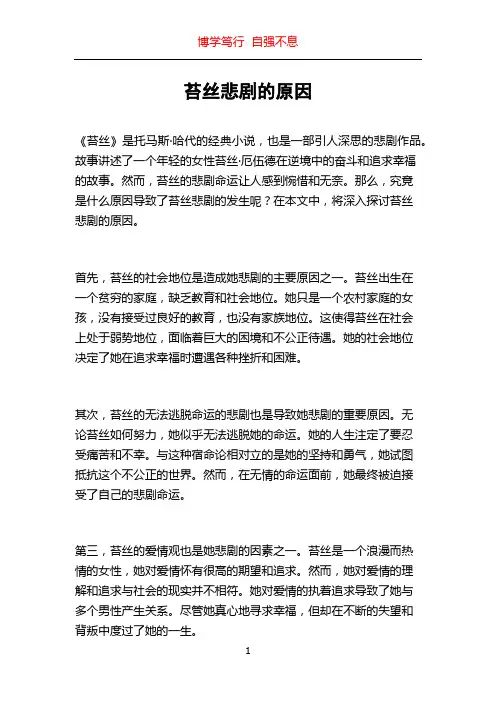
苔丝悲剧的原因《苔丝》是托马斯·哈代的经典小说,也是一部引人深思的悲剧作品。
故事讲述了一个年轻的女性苔丝·厄伍德在逆境中的奋斗和追求幸福的故事。
然而,苔丝的悲剧命运让人感到惋惜和无奈。
那么,究竟是什么原因导致了苔丝悲剧的发生呢?在本文中,将深入探讨苔丝悲剧的原因。
首先,苔丝的社会地位是造成她悲剧的主要原因之一。
苔丝出生在一个贫穷的家庭,缺乏教育和社会地位。
她只是一个农村家庭的女孩,没有接受过良好的教育,也没有家族地位。
这使得苔丝在社会上处于弱势地位,面临着巨大的困境和不公正待遇。
她的社会地位决定了她在追求幸福时遭遇各种挫折和困难。
其次,苔丝的无法逃脱命运的悲剧也是导致她悲剧的重要原因。
无论苔丝如何努力,她似乎无法逃脱她的命运。
她的人生注定了要忍受痛苦和不幸。
与这种宿命论相对立的是她的坚持和勇气,她试图抵抗这个不公正的世界。
然而,在无情的命运面前,她最终被迫接受了自己的悲剧命运。
第三,苔丝的爱情观也是她悲剧的因素之一。
苔丝是一个浪漫而热情的女性,她对爱情怀有很高的期望和追求。
然而,她对爱情的理解和追求与社会的现实并不相符。
她对爱情的执着追求导致了她与多个男性产生关系。
尽管她真心地寻求幸福,但却在不断的失望和背叛中度过了她的一生。
最后,苔丝自身的矛盾性格也是造成她悲剧的原因之一。
苔丝是一个既温柔又坚强的女性。
她具有独立和坚定的性格,同时又充满柔情和敏感。
然而,这种矛盾的性格使得她在面对复杂的情感和人际关系时容易受伤害。
她内心的矛盾和自我折磨使她无法获得真正的幸福和满足。
综上所述,苔丝悲剧的原因是多方面的。
她的社会地位、命运的无情和她自身的矛盾性格相互交织,使得她在追求幸福的过程中陷入无边的痛苦和不幸。
《苔丝》这部小说通过苔丝的悲剧命运,让读者深切感受到了生活的无常和残酷。
正如哈代在小说中所表达的那样,我们无法掌控一切,有时候命运注定我们要承受痛苦和困难。
然而,苔丝也教会了我们坚强和勇敢地面对困境,追求自己的幸福。
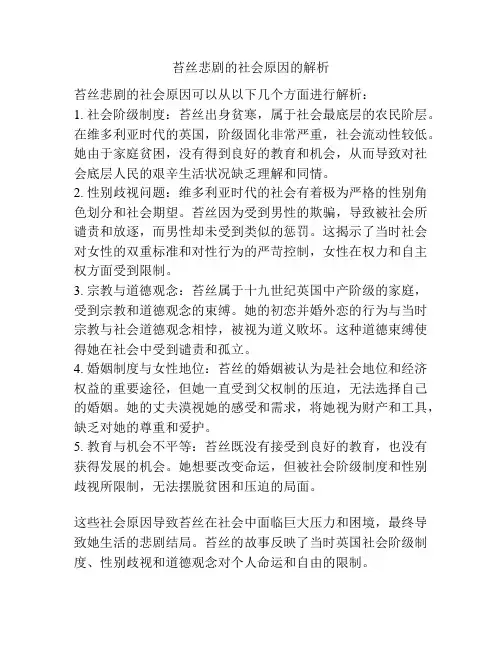
苔丝悲剧的社会原因的解析
苔丝悲剧的社会原因可以从以下几个方面进行解析:
1. 社会阶级制度:苔丝出身贫寒,属于社会最底层的农民阶层。
在维多利亚时代的英国,阶级固化非常严重,社会流动性较低。
她由于家庭贫困,没有得到良好的教育和机会,从而导致对社会底层人民的艰辛生活状况缺乏理解和同情。
2. 性别歧视问题:维多利亚时代的社会有着极为严格的性别角色划分和社会期望。
苔丝因为受到男性的欺骗,导致被社会所谴责和放逐,而男性却未受到类似的惩罚。
这揭示了当时社会对女性的双重标准和对性行为的严苛控制,女性在权力和自主权方面受到限制。
3. 宗教与道德观念:苔丝属于十九世纪英国中产阶级的家庭,受到宗教和道德观念的束缚。
她的初恋并婚外恋的行为与当时宗教与社会道德观念相悖,被视为道义败坏。
这种道德束缚使得她在社会中受到谴责和孤立。
4. 婚姻制度与女性地位:苔丝的婚姻被认为是社会地位和经济权益的重要途径,但她一直受到父权制的压迫,无法选择自己的婚姻。
她的丈夫漠视她的感受和需求,将她视为财产和工具,缺乏对她的尊重和爱护。
5. 教育与机会不平等:苔丝既没有接受到良好的教育,也没有获得发展的机会。
她想要改变命运,但被社会阶级制度和性别歧视所限制,无法摆脱贫困和压迫的局面。
这些社会原因导致苔丝在社会中面临巨大压力和困境,最终导致她生活的悲剧结局。
苔丝的故事反映了当时英国社会阶级制度、性别歧视和道德观念对个人命运和自由的限制。
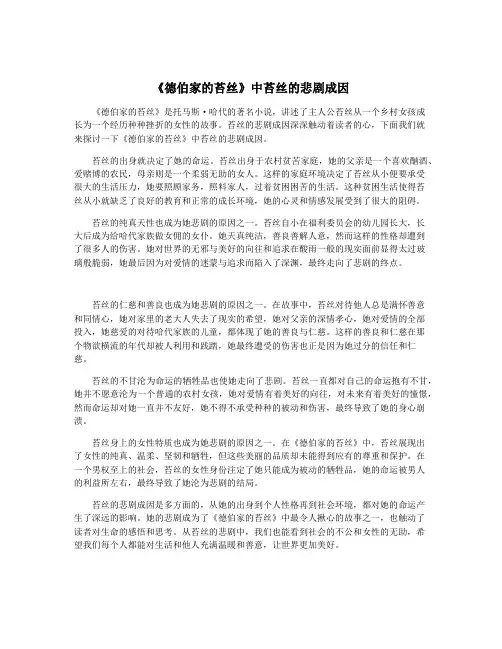
《德伯家的苔丝》中苔丝的悲剧成因《德伯家的苔丝》是托马斯·哈代的著名小说,讲述了主人公苔丝从一个乡村女孩成长为一个经历种种挫折的女性的故事。
苔丝的悲剧成因深深触动着读者的心,下面我们就来探讨一下《德伯家的苔丝》中苔丝的悲剧成因。
苔丝的出身就决定了她的命运。
苔丝出身于农村贫苦家庭,她的父亲是一个喜欢酗酒、爱赌博的农民,母亲则是一个柔弱无助的女人。
这样的家庭环境决定了苔丝从小便要承受很大的生活压力,她要照顾家务,照料家人,过着贫困困苦的生活。
这种贫困生活使得苔丝从小就缺乏了良好的教育和正常的成长环境,她的心灵和情感发展受到了很大的阻碍。
苔丝的纯真天性也成为她悲剧的原因之一。
苔丝自小在福利委员会的幼儿园长大,长大后成为给哈代家族做女佣的女仆。
她天真纯洁,善良善解人意,然而这样的性格却遭到了很多人的伤害。
她对世界的无邪与美好的向往和追求在酸雨一般的现实面前显得太过玻璃般脆弱,她最后因为对爱情的迷蒙与追求而陷入了深渊,最终走向了悲剧的终点。
苔丝的仁慈和善良也成为她悲剧的原因之一。
在故事中,苔丝对待他人总是满怀善意和同情心,她对家里的老大人失去了现实的希望,她对父亲的深情孝心,她对爱情的全部投入,她慈爱的对待哈代家族的儿童,都体现了她的善良与仁慈。
这样的善良和仁慈在那个物欲横流的年代却被人利用和践踏,她最终遭受的伤害也正是因为她过分的信任和仁慈。
苔丝的不甘沦为命运的牺牲品也使她走向了悲剧。
苔丝一直都对自己的命运抱有不甘,她并不愿意沦为一个普通的农村女孩,她对爱情有着美好的向往,对未来有着美好的憧憬,然而命运却对她一直并不友好,她不得不承受种种的被动和伤害,最终导致了她的身心崩溃。
苔丝身上的女性特质也成为她悲剧的原因之一。
在《德伯家的苔丝》中,苔丝展现出了女性的纯真、温柔、坚韧和牺牲,但这些美丽的品质却未能得到应有的尊重和保护。
在一个男权至上的社会,苔丝的女性身份注定了她只能成为被动的牺牲品,她的命运被男人的利益所左右,最终导致了她沦为悲剧的结局。
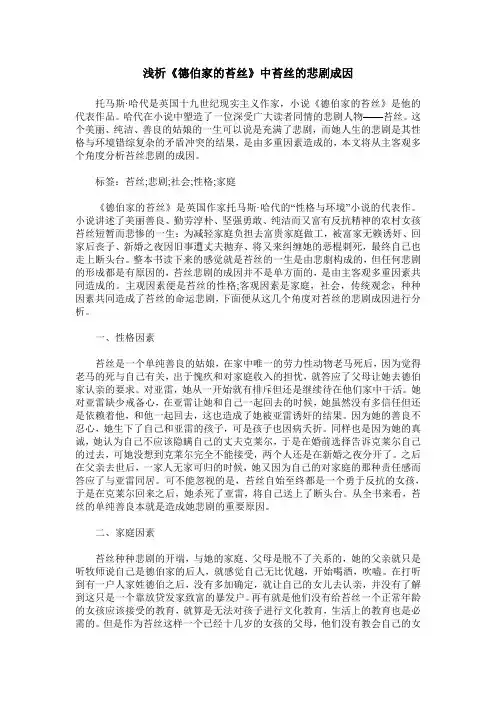
浅析《德伯家的苔丝》中苔丝的悲剧成因托马斯·哈代是英国十九世纪现实主义作家,小说《德伯家的苔丝》是他的代表作品。
哈代在小说中塑造了一位深受广大读者同情的悲剧人物——苔丝。
这个美丽、纯洁、善良的姑娘的一生可以说是充满了悲剧,而她人生的悲剧是其性格与环境错综复杂的矛盾冲突的结果,是由多重因素造成的,本文将从主客观多个角度分析苔丝悲剧的成因。
标签:苔丝;悲剧;社会;性格;家庭《德伯家的苔丝》是英国作家托马斯·哈代的“性格与环境”小说的代表作。
小说讲述了美丽善良、勤劳淳朴、坚强勇敢、纯洁而又富有反抗精神的农村女孩苔丝短暂而悲惨的一生:为减轻家庭负担去富贵家庭做工,被富家无赖诱奸、回家后丧子、新婚之夜因旧事遭丈夫抛弃、将又来纠缠她的恶棍刺死,最终自己也走上断头台。
整本书读下来的感觉就是苔丝的一生是由悲劇构成的,但任何悲剧的形成都是有原因的,苔丝悲剧的成因并不是单方面的,是由主客观多重因素共同造成的。
主观因素便是苔丝的性格;客观因素是家庭,社会,传统观念,种种因素共同造成了苔丝的命运悲剧,下面便从这几个角度对苔丝的悲剧成因进行分析。
一、性格因素苔丝是一个单纯善良的姑娘,在家中唯一的劳力性动物老马死后,因为觉得老马的死与自己有关,出于愧疚和对家庭收入的担忧,就答应了父母让她去德伯家认亲的要求。
对亚雷,她从一开始就有排斥但还是继续待在他们家中干活。
她对亚雷缺少戒备心,在亚雷让她和自己一起回去的时候,她虽然没有多信任但还是依赖着他,和他一起回去,这也造成了她被亚雷诱奸的结果。
因为她的善良不忍心,她生下了自己和亚雷的孩子,可是孩子也因病夭折。
同样也是因为她的真诚,她认为自己不应该隐瞒自己的丈夫克莱尔,于是在婚前选择告诉克莱尔自己的过去,可她没想到克莱尔完全不能接受,两个人还是在新婚之夜分开了。
之后在父亲去世后,一家人无家可归的时候,她又因为自己的对家庭的那种责任感而答应了与亚雷同居。
可不能忽视的是,苔丝自始至终都是一个勇于反抗的女孩,于是在克莱尔回来之后,她杀死了亚雷,将自己送上了断头台。
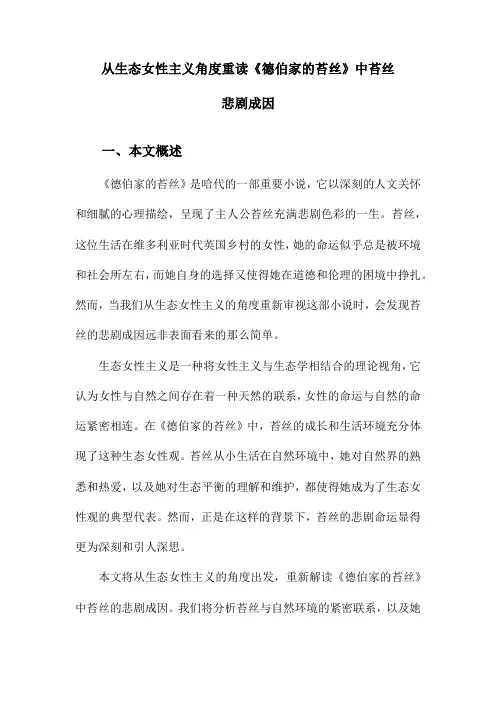
从生态女性主义角度重读《德伯家的苔丝》中苔丝悲剧成因一、本文概述《德伯家的苔丝》是哈代的一部重要小说,它以深刻的人文关怀和细腻的心理描绘,呈现了主人公苔丝充满悲剧色彩的一生。
苔丝,这位生活在维多利亚时代英国乡村的女性,她的命运似乎总是被环境和社会所左右,而她自身的选择又使得她在道德和伦理的困境中挣扎。
然而,当我们从生态女性主义的角度重新审视这部小说时,会发现苔丝的悲剧成因远非表面看来的那么简单。
生态女性主义是一种将女性主义与生态学相结合的理论视角,它认为女性与自然之间存在着一种天然的联系,女性的命运与自然的命运紧密相连。
在《德伯家的苔丝》中,苔丝的成长和生活环境充分体现了这种生态女性观。
苔丝从小生活在自然环境中,她对自然界的熟悉和热爱,以及她对生态平衡的理解和维护,都使得她成为了生态女性观的典型代表。
然而,正是在这样的背景下,苔丝的悲剧命运显得更为深刻和引人深思。
本文将从生态女性主义的角度出发,重新解读《德伯家的苔丝》中苔丝的悲剧成因。
我们将分析苔丝与自然环境的紧密联系,以及她如何在社会和道德的双重压迫下挣扎求生。
我们也将探讨导致苔丝悲剧的经济和政治因素,以及苔丝自身在道德和伦理困境中的选择。
通过这样的分析,我们希望能够更深入地理解苔丝悲剧的成因,以及生态女性主义对于理解和解决这一悲剧的重要性。
二、苔丝与自然的和谐共生苔丝,这位《德伯家的苔丝》中的主人公,她的生活与自然环境紧密相连,她的命运与大自然的律动息息相关。
从生态女性主义的角度审视,苔丝与自然的和谐共生不仅体现了她作为生态女性的独特魅力,更揭示了她的悲剧成因中隐含的生态女性主义视角。
苔丝从小生活在自然环境中,这使得她对自然有着一种特殊的感情和认知。
她熟悉草木花卉的生长和变化,了解它们与土地、水源、气候等自然条件的相互关系。
这种对自然的深刻理解和热爱,使得苔丝的行为和决策都充满了生态女性的智慧和关怀。
苔丝对生态的关注不仅停留在对自然景观的欣赏上,她更理解到生态平衡的重要性。
悲剧的审美特征在哈代的小说中表现得非常突出和集中。
正如在小说《德伯家的苔丝》,从苔丝身上我们看到一个纯洁可爱的女孩怀着美丽善良的愿望进行着完全正当的追求,可是却一次又一次地遭受磨难和挫折,她最终失败了,被彻底地毁灭了。
我们为她的遭遇不胜悲悯,又从她的不懈的追求中倍受感动与鼓舞。
在潸然泪下之时,我们看到的是真与善的闪光,领略到的是一种庄严悲怆的美。
一、造成苔丝悲剧命运的外部因素1.社会因素作者哈代生活在19世纪和20世纪之交,即维多利亚后期,正是英国由自由资本主义向帝国主义过渡的时期,资本主义在给英国社会创造了繁荣的经济的同时也加深了下层贫苦人民的苦难,曾经辉煌的维多利亚时代逐步走向衰败,英国的工业垄断地位也在动摇,随之出现了经济萧条。
资本主义工业入侵偏远落后的农业地区,破坏了古老的生产秩序,使许多以农耕为主的各阶层人们因受地主的无情剥削而面临生存危机。
哈代亲眼目睹了资本主义入侵农村致使农民破产的情况,他在作品中描写了资本主义给农村带来的灾难,并且对农民的悲惨境遇寄予同情。
哈代由于自己所处的社会时代的局限,尽管他想找出解决这些问题的出路,但是最终没有成功。
苔丝的悲剧就是在这样的大背景下上演的。
苔丝以其美丽、灵巧、勤劳纯朴、善良刚毅,如果生活在一个公正合理的社会,建立一个美满的家庭,过上普通百姓的日子是不难的,然而经济的贫困、生活的艰辛把她一步步推向深渊,最终成了这个畸形社会的牺牲品。
2.家庭因素。
家庭的破败贫穷是导致苔丝悲剧命运的一开始也是最直接的因素。
如果不是家庭贫困,苔丝就不必连夜去赶集;如果不是家庭贫困,父母也就不会逼迫她去认亲;如果不是家庭贫困,在克莱尔没回来的期间她也就不会受到那么多屈辱,更不会下嫁给亚历克。
由此可见,贫穷确实是导致苔丝悲剧命运的最重要条件之一。
尽管苔丝家处于绝望的困境,但她为了不接受亚历克的控制而挣扎着,而如果苔丝答应去爱他,亚历克是有能力去减轻她家的困难的。
可是苔丝内心发生着的冲突,是她的道德感和对家庭的忠诚造成的。
《德伯家的苔丝》中苔丝的悲剧成因《德伯家的苔丝》是托马斯·哈代创作的一部著名小说,讲述了苔丝的悲剧人生。
苔丝是一个可怜的女孩,她的悲剧成因主要包括社会地位、爱情和命运三个方面。
苔丝的社会地位造成了她的悲剧。
在19世纪的英国社会,贵族与平民之间的鸿沟非常明显,社会地位是人们命运的决定因素。
苔丝出生在一个贫困的家庭,她的父母没有多少社会地位,所以她从小就被注定了是一个社会底层的人。
由于家境贫困,她只能通过自己的努力和勤奋来改变自己的命运。
在当时的社会中,一个女性想要脱离贫困,并不是一件容易的事情。
苔丝凭借自己的聪明才智和勤奋,在一个大家族的农场工作,但最终仍无法脱离贫困的命运。
社会地位的局限性让她无法得到更好的生活,这也是她悲剧的一个重要原因。
爱情也是苔丝悲剧的原因之一。
在小说中,苔丝经历了三段爱情,每一段爱情都给她带来了不幸。
首先是她对安吉丽卡的爱慕,但由于自卑感和社会地位的差距,她并没有勇气表达自己的爱意。
接着是她与亨德利的婚姻,亨德利虽然对她表示出爱意,但最终却因为社会地位的不同而抛弃了她。
最后是她与亚历克斯·德伯的婚姻,亚历克斯的虚伪和自私,使苔丝陷入了更深的痛苦之中。
爱情的不顺和挫折,让苔丝陷入了绝望和痛苦之中,也成为她不幸的原因之一。
命运也是苔丝悲剧的原因之一。
在小说中,苔丝所面对的命运始终是不公平的。
她努力工作,勤奋学习,但最终还是被社会对她的偏见和对女性的不公平对待所限制。
她的一生中遭遇了太多的不公平和挫折,最终导致了她的悲剧命运。
在当时的社会中,一个普通女子很难摆脱社会对她的束缚,这也是苔丝命运不幸的原因之一。
苔丝的悲剧成因主要包括社会地位的限制、爱情的挫折和命运的不公平。
这些因素交织在一起,构成了她的悲剧命运。
《德伯家的苔丝》通过苔丝的悲剧故事,揭露了19世纪英国社会的黑暗面和对女性的不公平对待,也使得读者对于社会的不公和人性的冷酷有了更深刻的认识。
希望通过对这部小说的分析,我们能够更加珍惜现在的生活,并且在面对困难的时候坚定自己的信念和勇气,不让自己成为另一个苔丝。
《德伯家的苔丝》中苔丝的悲剧成因1. 引言1.1 苔丝的贫困家世苔丝生长在一个贫困的家庭中,家中经济拮据,生活困苦。
她的父亲鲍勃·斯特德利克是个酒精成瘾者,经常酗酒,无力扶养家庭。
苔丝的母亲也早逝,她从小就没有母爱的关怀。
贫困的家庭环境使得苔丝从小就学会独立生活,她不得不操劳家务,同时还要努力在贫困的环境下求学。
这种早熟的生活让苔丝在孩提时代就背负着沉重的责任,缺乏童年的快乐和无忧无虑。
贫困的家世让苔丝在成长过程中缺乏物质上的保障和精神上的支持,使得她心灵受到伤害,无法得到适当的疼爱和教育。
这种贫困家庭的环境让苔丝注定了一个不幸的命运,她没有选择权和足够的资源去改变自己的命运。
家庭的贫困成为了苔丝悲剧命运的开端,她在艰难的环境下成长,从小就背负着沉重的生活压力,这种贫困家世对于苔丝的悲剧命运产生了重大的影响。
1.2 苔丝的孤独成长苔丝的孤独成长始于她的童年时期。
她在一个贫困的家庭中长大,父母早逝,没有兄弟姐妹,更没有其他亲人照料。
这种家庭背景使得苔丝从小就学会了独立和坚强,但同时也埋下了她内心深处的孤独和无助之情。
在没有父母的指导下,苔丝不得不自己承担起家庭的重担,照顾家中的大小事务。
由于家庭的贫困,苔丝经常要去做农活来挣取微薄的饭食,这让她无法像其他同龄人一样接受正规的教育。
孤独的成长经历让苔丝无法体验到像样的童年时光,缺乏亲情的陪伴和指导,使得她的心灵长期处于空虚和孤独之中。
苔丝在孤独中长大,没有得到足够的关爱和教导,也没有人能够给予她温暖和安慰。
这种孤独成长的经历,成为了苔丝悲剧的导火索,使得她后来在生活中面对各种挫折和困难时,更加无助和无助。
苔丝的孤独成长是她悲剧成因中至关重要的一环。
2. 正文2.1 父亲的酗酒苔丝的父亲约翰·德伯是一个酗酒的人。
他是一个沉溺于酒精的农民,经常在醉酒后对家人施暴,给家庭带来了巨大的痛苦和困扰。
这种家庭环境使得苔丝从小就饱受父亲的虐待和家庭暴力的折磨。
浅析苔丝悲剧成因德伯家的苔丝中苔丝悲剧命运分析《德伯家的苔丝》是英国作家托马斯·哈代的长篇小说,讲述了一个苔丝从农村妇女晋升到富有绅士夫人再到堕入困境的悲剧命运。
苔丝的悲剧命运是由多重因素共同导致的,包括社会环境、家庭因素、个人选择等原因。
首先,社会环境是苔丝悲剧命运的重要因素之一、小说所描绘的时代背景是19世纪末的英国乡村社会,以农业为主导的封建社会仍然占主导地位。
在这个社会中,贫富悬殊极大,社会地位固化,阶级观念深入人心。
苔丝从小生活在贫困的农村环境中,没有机会上升到更高的社会阶层。
她自小就懂得读书,渴望通过知识改变自己的命运,但社会环境限制了她的发展空间,使她很难摆脱贫困窘境。
其次,家庭因素也对苔丝的命运产生了重要影响。
苔丝生活在一个家境贫寒的家庭中,父亲是一个喜欢饮酒的懒散农民,母亲早逝,家庭缺乏温暖和支持。
父亲对苔丝的关心不够,甚至觉得她是家庭的负担。
在这样的家庭环境中,苔丝从小就缺乏爱和安全感,导致她内心孤独、渴望得到他人的关注和认可。
此外,苔丝自身的个人选择也是她悲剧命运的重要原因。
小说中,苔丝为了改变自己的命运,勇敢地离开了家乡,寻找更好的生活。
然而,在她寻求幸福的过程中,她犯了几个致命的错误。
首先,她的纯真和孤独使她容易受到他人的诱惑和欺骗。
她先后爱上了两个男子-亚历克斯和安吉尔,但两者都不能给她真正的幸福。
苔丝对于自己的爱情选择没有足够的明智,很容易被情感左右,导致了她在这段感情中的痛苦和破碎。
总之,苔丝悲剧命运的成因是多方面的。
社会环境的限制、家庭的贫困和个人的选择错误都为她的悲剧埋下了伏笔。
苔丝的命运警示我们,社会环境和家庭因素对个人的发展和幸福有着重要的影响,但个人选择和决策也是至关重要的,我们应该警惕自己在人生的道路上的选择,并尽力避免重蹈苔丝的覆辙。
对苔丝悲剧命运的解读作者:于冬梅来源:《青年文学家》2014年第26期摘要:《德伯家的苔丝》是英国文学巨匠——托马斯·哈代“性格与环境小说”的代表作之一,在世界文学史上堪称悲剧小说的典范。
小说刻画了主人公苔丝悲剧及其中人物的人性特点,从不同侧面物揭示了19世纪维多利亚英国社会宗教伦理道德的腐败以及对人的身心的伤害,展现了社会底层劳动人民的生存困境,本文从试图从不同形态的人物身上,探讨苔丝悲剧命运的社会根源。
关键词:哈代小说;苔丝;悲剧命运;人物作者简介:(1964-),女,辽宁喀左人,蒙古族,讲师,硕士,研究方向:英语语言文学。
[中图分类号]:I106 [文献标识码]:A[文章编号]:1002-2139(2014)-26--01托马斯·哈代是英国现实主义作家,他的“性格与环境”表现了19世纪维多利亚时期英国社会中人与人、人与社会的冲突和矛盾。
其中尤以小说《德伯家的苔丝》最为典型,小说围绕着被侮妇女苔丝的悲剧命运展开,揭露了19世纪英国社会宗教和伦理道德对人的身心摧残和人性的弱点,其中尤以主人公苔丝的悲剧最为典型,其中环境是苔丝悲剧的主线,本文试图从影响苔丝命运的人物形象身上,挖掘其悲剧的社会根源。
一、苔丝父母虚荣心是苔丝悲剧命运的诱因小说的主人公苔丝是纯朴的大自然的女儿,她天生美丽纯洁农村姑娘,她的生活环境是一个宗教法规和社会习俗森严的维多利亚乡村,她的父亲是个懒惰无能,虚荣愚昧,时常贪杯的小贩子。
而母亲是个浅薄庸俗,满脑子迷信思想,仅靠一本算命大全来判断是非的农妇,家里贫寒,由于家中唯一劳动力“老马” 的死去,使得本来拮据的生活顿时陷于困境,此时,苔丝父亲从一个牧师那听说他是贵族的嫡系,这对夫妻对此深信不疑,带着重振家业的美梦和攀龙附凤的虚荣心,他们决定让自己单纯的女儿苔丝去认这门远亲,作为长女的苔丝为了替父母分担家庭重担,铤而走险,不料遭到恶少的奸污,失去贞操,落下了“堕落女人”名声,这次事件对苔丝影响极其大,从此拉开了苔丝命运悲剧的序幕,因此,苔丝父母的虚荣心和利欲熏心是她个人悲剧的诱因,也是她的家庭悲剧的根源。
《德伯家的苔丝》中苔丝的悲剧成因《德伯家的苔丝》是英国著名作家托马斯·哈代的代表作之一,讲述了一个贫苦家庭的女孩苔丝在追寻自由和幸福的过程中遭遇的一系列悲剧。
苔丝的悲剧成因可以从多个方面来分析。
一是社会背景。
小说所描写的时代是十九世纪末的英国,当时的社会阶级分化非常严重,贫富的差距极大。
贫苦的苔丝身处于社会的最底层,受到社会的歧视和压迫,无法改变自己的命运。
她的出生就注定了她只能在社会的边缘挣扎生存,而且在如此恶劣的生存环境中,她的个性更加沉稳,容易忍耐,这又使得她更加容易受到他人的欺负和摆布。
二是家庭环境。
苔丝出生在一个贫困的家庭中,家庭的经济状况极度不稳定。
尤其是她的父亲常常沉溺于酒精中难以自拔,无力承担家庭的生活开支,这使得苔丝一家人的生活非常艰难。
而苔丝的母亲则是个痴心妄想的人,她希望通过苔丝的美貌可以让她改善家庭的经济状况,不断推销她去打工,甚至连婚姻都可以拿出去买卖。
这种家庭环境使苔丝倍感无助和无奈,无论走到哪里都感觉像是处于一个囚笼之中。
三是感情生活。
苔丝在感情生活中的悲剧也是非常显著的。
虽然她在德伯府度过了一段幸福的时光,看到了希望,但她还是无法迎来自己真正的幸福。
原因在于,苔丝爱上了犹太人阿伯拉罕·西姆童子,而这种跨越阶级和文化的恋情在当时的社会是不被允许的。
阿伯拉罕·西姆童子身为犹太人,他的身份和传统经历使得这场恋情注定不会成功。
而苔丝的自尊心又使得她不愿意妥协,最终导致她失去了爱情和自由。
总之,苔丝的悲剧成因来源复杂且多方面,反映了十九世纪英国社会阶级分化的严重现状,也反映了当时社会对于自由和平等的缺乏认知。
托马斯·哈代通过塑造苔丝这一角色,揭示了当时社会的阴暗面,同时也引起了人们对于社会公正和人权的思考和关注。
An Analysis of Tess‟s tragedy in Tess of the d‟Urberville sAbstractTess of the D‟Urbervilles is one of the great works by Thomas Hardy. It is a great tragedy,which was published in 1891.This tragedy centers on Tess, a peasant girlborn in a po or family. Everything happening has its causes. Tess‟s tragedy is also not accidental. There are several aspects about the causes. In this paper,I try to explore thecauses for Tess‟s tragedy in three aspects: (1) the influence of fatalism; (2) the socialfactors concerned; and (3) Tess‟s dual personality.Key words: Tess of the D’Urbervilles;Thomas Hardy;tragedy; the causes摘要德伯家的苔丝是哈代的巨著之一,1891年出版的一部悲剧。
这部悲剧围绕着出生在贫苦农民家庭的少女苔丝展开。
一切万物皆有因果,苔丝的悲剧也不例外。
苔丝的悲剧结局并不是意外,有各个方面的原因所在。
在这里,我将从以下三个方面,即:哈代的宿命论,社会因素,和苔丝的性格来分析苔丝悲剧命运的原因。
关键字:德伯家的苔丝,哈代,悲剧,原因Table of ContentsAcknowledgements .................................................................................................................. (i)Abstract (ii)摘要................................................................................................................................................ i ii Table of Contents .......................................................................................... 错误!未定义书签。
Introduction . (1)Chapter One Hardy's Fatalism in the Tragedy of Tess (3)1.1 The Development of Hardy's Fatalism (3)1.2 Hardy's Pessimitic Fatalism in Tess' Tragedy (3)Chapter Two The Social Factors in Tess' Tragedy (5)2.1 The Social Environment and the Development of Capiatalism (5)2.2 Tess' Poor Family and Her Parents' Stupid Requirements of Tess (5)2.3 The Social Morality and its Influences on Tess (7)2.3.1 The Hypocritical Social Morality (7)2.3.2 The Influence of Moralism on Tess (8)2.4 Male's Domination of Female (9)Chapter Three Tess' Personality in Her Tragedy (11)3.1 Tess' Rebellion (11)3.2 Tess' Weak Point in Character (13)Conclusion (14)Works Cited (15)Introduction1 A brief introduction to Hardy1.1 Hardy and his life environmentThomas Hardy was a famous British novelist and poet in the nineteenth century. He carried forward and developed the literary traditions of the Victorian Age. He described the tragic plots vividly and truthfully in his works. He was considered as “Shakespeare of British novels”. Hardy was born in an a mason‟s family in Drossier, south west of England, the area that later became the famous “Wessex” in many of his novels .He was expected to become an architect by his parents, and then he was trained as an architect and worked in London and Dorset for ten years. Hardy began his writing career as a novelist in 1871 publishing Desperate Remedies(《计出无奈》). He was soon successful and left architecture for writing. He became a great critical realist in the nineteenth century—the Victorian Age, during which great changes had happened in the history of western civilization. As is well known, a great social reformation took place in Britain. The various social factors including religion, politics, science, influenced people and tried to transform their mentality. Capitalism was highly developed and stretched to the vast countryside, and the British people were struggling for a bright future bravely and difficultly. It was during this special period that Thomas Hardy inherited and developed the Victorian literature, producing a lot of great novels,especially Tess of the D‟Urbervilles.In these novels,he exposed the hypocritical morals, laws and people‟s miserable life, especially the women‟s life in social economic, politics, morals, custom, etc. after the invasion of industrial capitalism to the British villages.1.2 Hardy's philosophical idea—fatalism and his novelsIn Hardy life, he has written many novels. His major works are The Return of the Native (1878), The Mayor of Caster Bridge (1886), Tess of the D'Urbervilles (1891), and Jude the Obscure (1896), the latter two considered masterpieces. Hardy's novels are all set against the tough and frightful Dorset landscape (known as Wessexin the novels). The tragedy in his novels was certainly arranged by God's will. No matter how hard people worked and resisted, they couldn‟t get rid of the domination. The characters of his novels, for the major part of the poorer rural classes, are sympathetically and often humorously portrayed. Their lives were ruled not only by nature but also by rigid Victorian social conventions. Hardy's style is always pessimistic and tragic. His idea had been vividly expressed in his novels. Everything in his story leads to one inevitable tragic ending. One‟s personality determines one‟s fate, as is thought, thus the heroes and heroines in Hardy‟s novels are mostly rural men and women whose characters were provincial, tinted with the traits of rural people—passionate like fire, naive,innocent and narrow-minded—which on one hand make them so lovely and worth sympathy, but contribute to their tragedy on the other hand.2 An tntroduction to the novel- Tess of the D’UrbervillesAs is well known, Tess of the D'Urbervilles is the most famous novel of Thomas Hardy. Focusing on the tragic experience of its heroine Tess,a peasant girl, who was born in a poor farmer‟s family. She had lived a poor but peaceful life. However, God, began to play a cruel joke on this innocent girl when her father, John D'Urbervilles learned that they were descended from the D‟Urbervilles, an ancient family o nce renowned in England. Tess‟s parents were in an ecstasy of delight over the news. Her mother urged Tess to claim kinship with the remaining D‟Urbervilles, so that Tess could marry a gentleman,and then they will get rid of the poor life. She was very unwilling,but when she thought of the death of their horse, the only means to make their living, she came to the D‟Urbervilles. There she met Alec D‟Urbervilles, who was attracked by Tess‟s beautiful appearence and always tried to seduce her. Having received a job of tending to chickens, Tess stayed in the D‟Urbervilles. Her tragic life had just begun.Soon Tess was raped and lost her chastity.She returned home and told her mother of her terrible experiences,hoping to get consolation from her mother, but what her mother only worried about was whether Alec would marry Tess or not. Alecutilized the fact of her poor family and wanted to help her. The brave girl refused and went to work in the field, but worse still, Alect followed her from place to place in order to possess her again. At last, Tess managed to get rid of Alec to give birth to her baby. The baby did not live long, however, and after its death, Tess went to a dairy farm as a dairy maid. It was here that Tess met Angel,son of a clergyman,and fell in love with him. He thought of her as a beautiful and innocent young girl. But her innocence caused her to feel that she was wicked, so she rejected Angel Clare's love. She refused his love and urged him to turn to one of the other girls even though she suffered much from a great grief. But Angel, acting against the wishes of his parents, insisted on marrying with her. Finally, they got married. It seems Tess would be happy from now on. On their wedding night, they told each other about their past hoping to be forgiven by each other. Tess forgave Angel's past, and then she told about her nightmare with Alec, thinking that he would forgive her as she had. But in contrast Angel deserted her and left for Brazil. In order to keep herself and her family alive, Tess had to became a labor in the field again. What‟s worse, her father died. With the bad condition of her family and no hope to obtain Angel's return, the poor girl went to Alec again ,seeking help from Alec, who is a preacher now,and lived with him as his mistress.Unexpectedly, Angel returned from Brazil and repented of his cruel treatment of Tess.But Tess's relationship with Alec stopped her from living with Angel happily. She hated Alec and believed all her tragedy was caused by Alec. She killed him. After a short happy life with Angel, Tess was arrested by the police and hanged.Chapter OneHardy’s fatalism in the tragedy of Tess.1.1 The development of Hardy's fatalism.Fatalism is "that view of life which says all actions is controlled by the nature of thing or by fate which is a great impersonal, primitive force existing through all eternity absolutely independent of human will and superior to any good created by man. "(Force,Lorrain.M.1996). Hardy's pessimistic fatalism developed in his surrounding environment. He lived in times of a freedom of capitalism to imperialism by the United Kingdom after a period of a prosperous economy, but also deepened the plight of poor people at lower levels, especially in the nineteenth century. Hardy was born and bred in rural England which was full of the fatal idea by which his novels were deeply impacted. Thus he witnessed the invasion of capitalist farmers in rural areas led to bankruptcy, he depicted in his works that the capitalism had brought disaster to rural farmers, and sympathy to the plight of the farmers, but due to Hardy's social limitations of the era, even though he would like to find a way out to solve these problems,there was no right way to free poor people of their misery and to embrace a bright future, he ultimately failed,which led him to be a pessimist.In fact,Hardy did not understand the root causes of this decline and rules of social development.Therefore, he attributed the peasants' tragedy to blind chance or mysterious fate. This kind of fatalism is revealed in Hardy's many works especially in Tess of the D'Urbervilles. Hardy gave to the interpretation of the story in accordance with his pessimist and determinist view of the world.( In a sense, Tess is the victim of Hardy's fatalism, and her tragedy is the tragedy of the time when Hardy lives.1.2 Hardy's pessimistic fatalism in Tess' tragedy.Tess's miserable life is linked with Hardy's fatalism.Hardy tried to explain the misfortune of his characters in the perspective of the superior power. In his novels, the characters' misfortunate fate is inevitable, and even hard to resist. In Tess of the D‟Urbervilles,Hardy thought that it was the god‟s will that made Tess‟ tragedy,including her ups and downs of life, her painful love and her tragic death. He demonstrated his deep sense of moral sympathy for the pure, loyal, intelligent and charming young girl, Tess. He showed in many ways that Tess's fate was not determined by her own efforts but by the fatalistic fate. There were lots of coincidences and hints that show us the inevitability of Tess' miserable death.Her misfortune starts from the sudden death of the only horse,which cut off all the family‟s income. Just at that time, Tess's father learned of a rich family—Alec D'Urbervilles whi ch was his kinship. This was the start of Tess‟s tragedy.So Tess is forced to claim kinship and not long after she is seduced. After the great frustration, desiring to live a tranquil life, Tess met Angel Clare and fell in love with him. Not wanting to deceive Angel, Tess wrote a letter to confess her "wrong doings", but the letter was misplaced and escaped the notice of Angel.It seems Tess would win happiness while actually this coincidence made her hurt much deeper. At that time, there were dual standards on morality: women are considered immoral if they conduct sexual intercourses before their marriage, be they passive or active. However men were not to blame if they have had sexual affairs before marriage, they could be easily forgiven. Just as Tess could forgive his sexual experience, but he couldn't accept Tess on similar grounds, thus he deserted her and left for Brazil. Though Hardy knew Tess was a victim and very innocent, at that time Hardy himself was also influenced by the social concept, as can be seen in Tess' miserable fate.Father's death made the family lose their house and hardly able to survive. Tess came to Angel's family for help because Angel was her nominal husband anyway. Unfortunately, they all went to church and Angel's brother found her broken shoes and threw them away casually, so Tess missed the chance. She could not get a hand from husband's family so that she had to find a job to support her family. The next plot of the story is the best example of Hardy‟s fatalism. He led Tess t o meet Alec—the man who ruined her life in the way back home from the Angel at this critical point. Faced with such a desperate situation, Tess had no choice but be Alec's mistress again and lived with him. Tess didn't surrender to fate after being insulted, for she was determined to overcome difficulties by herself, but after a series of resistance she hadto give up to the fate which was that powerful. Her life and the tragedy is really inevitable when Angel came back to look for her. If Angel didn't find her and told he had forgiven her and still loved her, Tess might just as well have lived with Alec and would not have killed Alec out of rage, and would not have been hanged as a murderer at last. Hardy devised this plot to show his dissatisfaction with the hypocritical society, as is manifest in the subtitle, Tess is a pure woman in spirit, what the society could insult was just her body.Hardy's novel in this series of coincidences, on the surface, as if the tragedy of Tess's fate escape the fate of the arrangement, but from a deeper perspective, is Hardy's fatalism philosophy due to the environment.Chapter TwoThe social factors in Tess’ tragedy.Throughout the story, Tess' experience has been rather miserable and rough, which makes readers deeply sympathetic with her. From the vivid description in the novel we can get a panorama of every social stratum in the Victorian Age. Tess, a beautiful, innocent and pure girl, is the victim of society. In this paper, it is thought that the bourgeois society should assume a great responsibility for Tess‟s miserable death. Tess' s tragedy is the product of the society.Hence a probe into the causes for Tess' tragedy in terms of social factors in four aspects.2.1 The social environment and the development of capitalismTess lived in the late 19th century in Britain,, in which the cruel capitalist exploitation had ruined the English countryside severely, Wessx was not immuned from the destruction. Capitalism brought a great harm to this old, rural and agricultural life of the place. The bourgeoisie controlled all rights, and the law served them. Peasants were at the bottom of society; they never had equal rights. Worse still, with the development of the industrial revolution, tremendous changes had taken place in almost every aspect. (Long Qiyu, 2010: 1) There is no doubt that agriculture could not be an exception, for the traditional life-style of the rural area had collapsed. Most farmers lost their land and were bankrupt.The self-supporting peasants were displaced and impoverished. They were extremely poor and lived a very miserable life and had to struggle for existence on the brink of death.Tess, a daughter of a poor villager, and a wage labor later, seemed unlikely to live a better life with her family. All the family's income came from an old horse, whose death cut off all their income. To support the family, Tess had no choice but to follow her parents' advice to come to a more prosperous branch of the D‟Urbervilles family for help. It was there that she was seduced by her so-called cousin, the son of the house, Alec, which led her to her misfortune fate.2.2 Tess’s poor family and her parents’ stupid requirements ofTessTess‟ family is another important reason for her tragedy. On one hand, her family was very poor. Her father was a lazy vendor and her mother was a vulgar wash worker. She had young brothers and sisters who needed care. “Every day seemed to throw upon her young shoulders more of family burdens” (Hardy p37), so she had no choice but to try her best to make money to support her family out of her sense of responsibility. On the other hand, her parents wanted to live a better life and showed off the so-called “aristocrat” status.Her father went into ecstasies when he got knowl edge of their kindred with the noble D‟Urbervilles. He began to spend his time thinking of ways to restore his family name to its former reputation. In fact, this dream could not support the family at all. But the father was only concerned about his reputation and did not want to get a job which he thought would sully(玷污) his dignity as an offspring of D‟Urbervilles. So they compelled Tess to D‟Urbervilles family to work and marry the wealthy gentleman. As the oldest daughter of the family, Tess had to come to Alec's family for help, which led to her loss of virginity. Even at this point, what her father considered utmost was other people's thought about the collapse of his reputation rather than his daughter's misfortune. Tess's mother hoped that Tess would marry with Alec without considering Tess' feeling. After Tess was seduced by Alec and went home, her mother thought Tess was stupid for her unwillingness to marry with him. To some extent, it is Tess‟ parents who make the chance for Alec. In other words, Tess is a tool used to get money and reputation for her parents. Tess would not enter D‟Urbervilles family if her family is better off; Tess would not be insulted by Alec if her family does not give her any pressure. What‟s worse, her family never teaches her anything that a girl needs to know. Tess says, “Why didn‟t you tell me there was danger in men-fold? Why didn‟t you warn me? I never had the chance o‟learning in that way (reading novels), and you did not help me” (Thomas Hardy p89). This proves how he r mother treats her.Tess loved her younger brothers and sisters, for her sense of responsibility compelled her to protect them. Alec was aware of this aspect and utilized his assistance to her family to possess her again. Tess‟ hatred of Alec‟s conduct ma de her refuse and fight with him at first. But after the death of her father, oppressed by herresponsibility for her family, she became Alec's mistress again, which made Tess much more grieved and led to her killing of him in that she thought that it was Alec who had deprived her of her right to pursue happiness. Therefore, “it is this homeless despair of a family which has lost its rights and independence in the village community that gives Tess finally into the invader‟s power” (Albert J LaValley p327).2.3 The social morality and its influences on Tess.2.3.1 The hypocritically social morality.For women in the Victorian era, the key virtue is sexual purity, while adultery is the worst of all possible sins. At that time, even exposing an ankle or a shoulder is considered "improper" (Kramer, 1970: 136). Public conceptions on sexual morals are that women must remain virgins before marriage,or she would commit the most serious sin. In addition, a woman should be loyal to her husband all her life.Numerous examples can be found in many great novels, such as Tess and the heroine in The Scarlet Letter. The sexual morality is deeply rooted in people's mind. But these notions are always unequal for females. In the same case, men engaged in sexual lapses(丧失) would be forgiven, whereas women would be condemned, even if it is known that the woman sometimes is actually the victim. In the opinion of most common people, “all women are considered serious offenders " (Kramer, 1979: 227) People didn‟t condemn Alec, the wicked rapist, while in contrast, they looked down on Tess who was pregnant due to a wicked man‟s rape. For in their eyes, Tess‟ loss of her virginity was a shameful thing. So, though with similar sexual experiences, Angel was forgiven while Tess, the real innocent victim, was abused. While Angel swore his deep love for Tess, Tess won no consolation or sympathy, even from her parents. What she got was jeer and abuse and lots of ill words. Everyone around despised Tess, which made her feel sinful and guilty. At the very start, he loved Tess and did not care whether she was born in a good family or not. He regarded Tess as a girl completely innocent and pure, for in his eyes, Tess is “what a fresh and pure daughter of nature that dairy-maid is” (Hardy 1992: 91) .It seems that his love to Tess was true love. But in fact, he was a representative of the traditional moral concepts.When it comes to marriage, he still considered Tess‟s social status. He wanted Tess to take “mistressTeresa D‟Urbervilles as her name and he claimed that the change “may take an appreciable difference to (society‟s)acceptance of you as my wife”. Angel said, after he have made Tess the well-read woman that he mean to make her, his mother will think much better of her (Hardy p206). So all he wanted is a good wife who could serve him and he had never abandoned the Christian moral concepts even though he himself did not realize.After learning of Tess' past story Tess was nothing but a fallen woman who just looks like his lover, as is ev ident in his remark, “you were one person, now you are another.”(Hardy, 1992: 374). He loved Tess but could not forgive her. He used the conventional social morality which he criticized to judge Tess without considering whether it was fair to her or not, and finally deserted her. The whole society with deep-rooted traditional social morality was prejudiced against Tess, which somewhat led to her miserable fate.2.3.2. The influence of morality on TessAs a social system, the deep-rooted concept of chastity controls women tightly. It is very natural to judge a woman's purity in line with the traditional conception; Tess was influenced by the social morality though she thought it is unfair. She also wanted to resist against it, for example, when her mother asked her to marry Alec, she didn‟t accept and replied “perhaps any woman will, but I am the exception” (Hardy 1992: 156) Tess was the victim of society full of hypocritical ethics. She really wanted to start a new life but she could not shake off her past.After she was insulted by Alec, Tess suffered a sense of sin, guilt and self-abasement. she felt much guilty for not being pure in body. When Tess falls in love with Angel Clare, she still cannot get rid of her sense of guilt. At first,she dare not tell Angel her past story, let alone have the courage to accept his love. "Her love for him acts to blot out the memories of the past in her, but she is always aware that her forgetfulness is only temporary, that the doubts, fears, and shame were only waiting like wolves just outside the light. One night, when the two of them were sitting indoors, she suddenly exclaims that she is not worthy of him."(Thamas Hardy, 1993). After their wedding ceremony, Tess is sad by the time they come back to the farm. She is tortured by guilt. She asks herself, if she has any right to be Mrs. AngelClare. Tess's deep sense of guilt makes her submit to Angel's maltreatment without resistance, thinking she deserves it.So in her mind it was all her fault to lead Angel to desert her. It can be seen apparently that Tess's chain to morality made her suffer much more in spirit, thus deepening her tragedy.2.4. Male’s domination of femalesCritically speaking, men and women should be equal; however, it is not the case in reality. You will find that the entire development of western civilization is a history in which males have dominated. In this kind of society men are the center of the society at Victorian times. Women are just the possession of men. They have no right to make any decisions. A male made all decisions and controlled everything, his wife was only supposed to be his faithful companion.Tess‟s family had a strong sense of male chauvinism. When the horse died and her family lost the only possession. Tess‟s family thought that the“fine chance” to get rid of poverty and get into the upper class was to marry a rich man. Her mother asked her to “claim kin” with the D‟Urbervilles, hoping that the “gentleman” would marry her and got their poor family condition improved. As a woman and the elder daughter of her family, all she should do is making money to support her family. She had no choice but to follow what her family‟s advice. In Alec's view, it's very natural that he could use his power and social status to get what he wants. He began to think of how to possess this girl when Tess first appeared in front of hm. What he thought of was how to possess the beautiful and pure girl. What‟s worse, Alec has never had the idea to marry her even after he raped her. He just treated her as one of his possessions. But men would never have any fault even if they commit the most serious sin. Tess was rumored by people around her after she was raped by Alec. No one helped her out of the despair, including her family. While Alec was a typical representative of hypocritical bourgeois society. He was not affected by the affair at all. Instead, he finally became a clergy who could represent the mercy of GOD and was respected by people. There was no law which could give Alec any punishment for his fault. But the law did exist when Tess killed Alec for her true love for Angel. In Tess' opinion, Angel Clare was her …god‟ who would protect her and guide her to happiness. But even theman who loved her denied the true identity of her just because her loss of virtue and deserted her. At that time, a woman deserted by her husband means she would be deserted by the whole society. Tess got the punishment, but men never did. . If we say it was Alec that insulted Tess and destroyed her happy personality, it was Angel who ruined Tess' mentality and was the executioner of Tess.That was the society under men‟s dominion.Chapter ThreeTess’ personality in her tragedy.Tess's tragedy not only results from the external causes, but also the internal ones. And only through the internal causes, can the external causes become operative. The tragedy that results from the conflict between man and himself is the tragedy of character. Tess's tragedy is the tragedy of character. On the one hand, Tess struggles bravely against her destiny and the conventional morality. She desires for happiness and true love. On the other hand, she can not completely get rid of social conventions and moral standards of the day, which makes her believe that she has to pay for what she has sinned. She yields to the arrangement of the fate.This is the so-called Tess‟s dual personality. The paradox of Tess‟s personality was one of the important causes for her later tragedy.3.1. Tess' rebellionDuring the Victorian Age, women began to struggle against oppression in unfair bourgeois society. Tess was one of these women. In Tess' brief miserable life, she had never given up rebellion.Tess fought against the male chauvinism all her life. A good way to become rich and get comfortable life was to marry a rich man at Victorian times. But Tess did not follow trends. On one hand, when the horse died, Tess‟s family asked her to “claim kin” to D‟Urbervilles, she was reluctant. She believed that she could make a living by working but not by marryin g a rich man. At Tess‟s time, chastity was very important for a woman. If a woman was raped, the best choice was to marry the man without considering whether she loved the man or not. Otherwise, she would be rumored and lost all her face. Tess should have married Alec after she was raped by him for the sake of herself and her family. And Tess could avoid her miserable life if she married him in line with her parents‟ wish. Tess‟s mother was disappointed that Tess would not marry Alec and bring some money and good reputation for her family. For Tess, that was silly and absurd. She did not want to betray herself even though she。